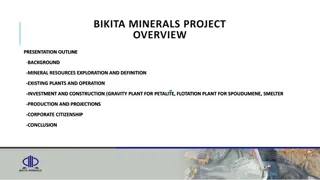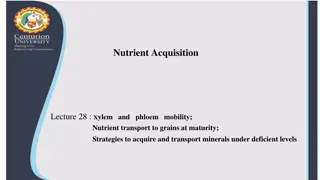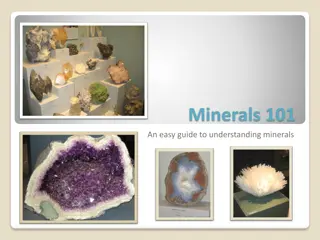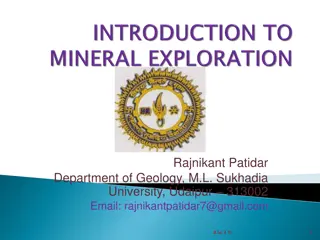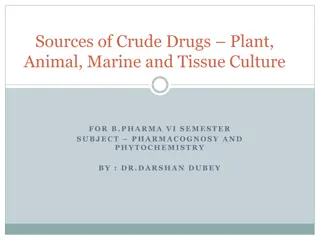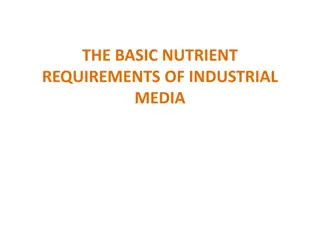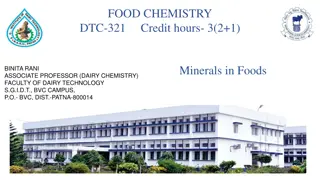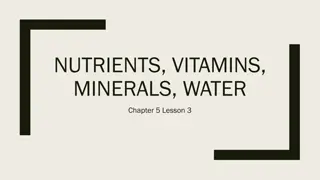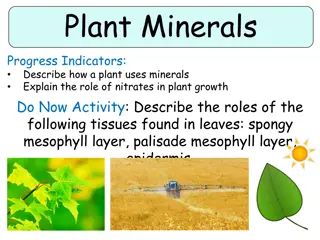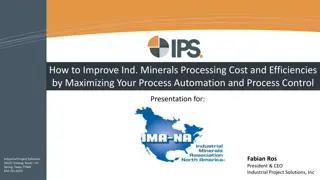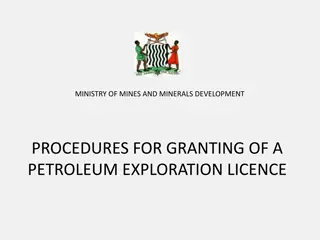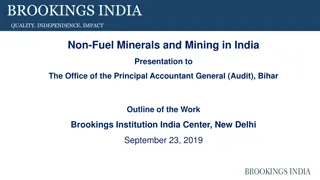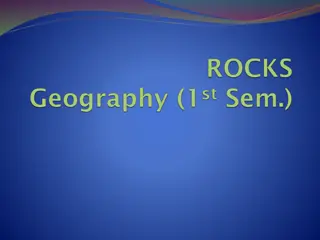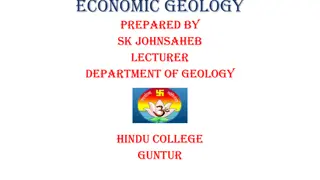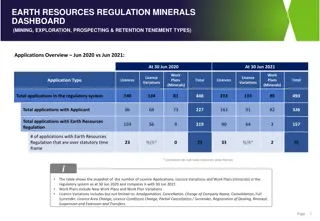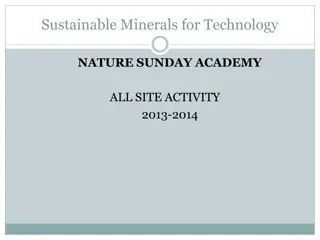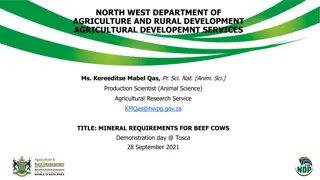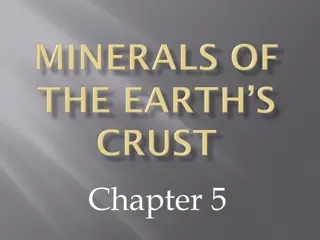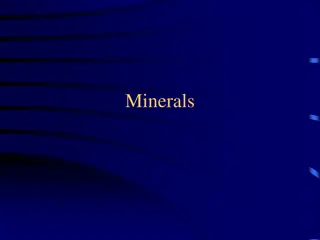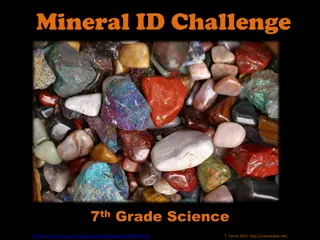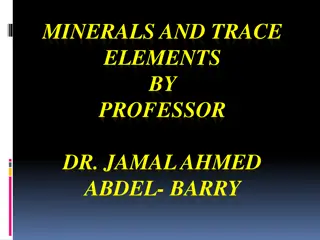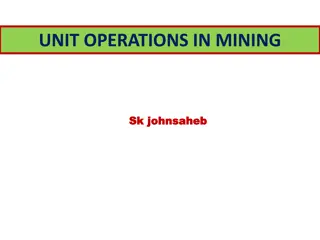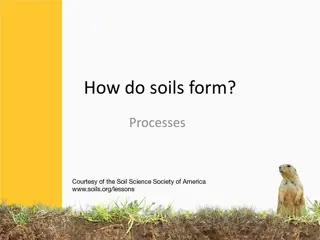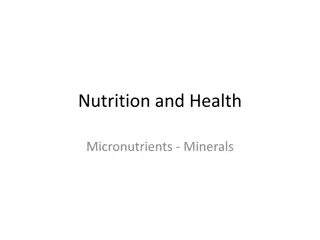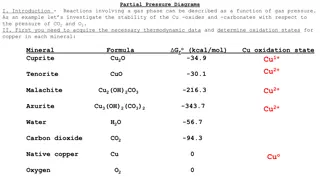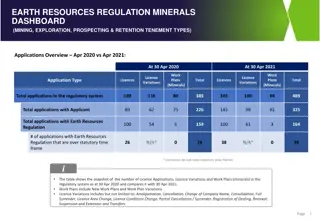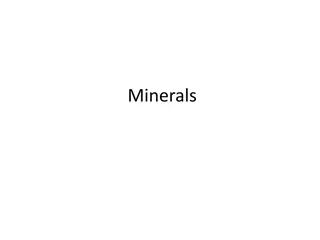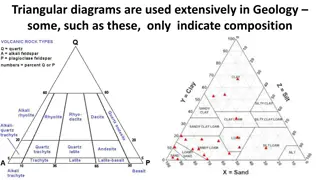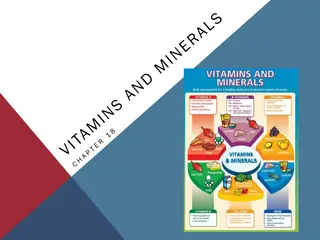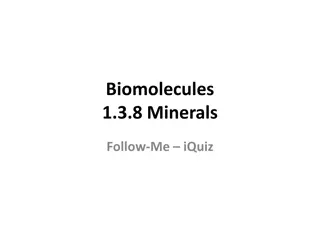Bikita Minerals Project Overview
Bikita Minerals is a historic mine acquired by Sinomine in 2022, with significant investments in exploration and expansion. The project includes mineral resources exploration, existing plants and operations, investment in construction, production projections, corporate citizenship, and more. The min
2 views • 17 slides
Nutrient Acquisition
Plants utilize xylem and phloem to transport water, nutrients, and minerals throughout their structures. Xylem moves water and mineral salts from roots to leaves, while phloem transports sugars and amino acids from leaves to the rest of the plant. Nutrient acquisition involves passive and active tra
2 views • 6 slides
Chile's Resource Riches: Minerals, Renewable Energy, and Sustainable Growth
Chile, as a resource-rich country, holds significant reserves of copper and lithium, key minerals for global sustainable development. With a focus on renewable energy sources like solar and wind power, Chile is leading in the energy transition towards a greener future. The country's responsible mini
3 views • 10 slides
Minerals Security Partnership Symposium Highlights Global Demand for Critical Minerals
The Minerals Security Partnership Symposium discussed the increasing demand for critical minerals driven by the energy transition and the necessity of robust supply chains. Top producers and processors of key minerals were highlighted, emphasizing the need for international collaboration to ensure s
2 views • 14 slides
Best Salt for Minerals Essential Nutrients for Your Body
Learn about the ideal salt for essential minerals at Bouldersaltcompany.com. Enhance the essence of your meals with our unrefined, unadulterated salt. Come and experience the difference today!\n\n\/\/ \/what-is-the-healthiest-salt\/
6 views • 1 slides
Understanding Minerals: A Comprehensive Guide
Earth's crust is composed of rocks made up of different minerals, which are naturally occurring, inorganic solids with distinct atomic structures and chemical compositions. Minerals exhibit properties like solidity, natural occurrence, inorganic nature, fixed composition, and crystal form. Identifyi
2 views • 20 slides
Understanding Minerals, Rocks, and Ores in Geology Studies
Exploring the world of geology, this content delves into minerals as inorganic substances with specific compositions, rock formations of various origins, and ore classifications encompassing metallic, noble, industrial, gemstone, and fuel resources. It covers the definitions, characteristics, and cl
0 views • 19 slides
Understanding Nutrition and Digestion for Optimal Health
Nutrients obtained from the environment are essential for growth, repair, and regulation in organisms. Macronutrients like carbohydrates, lipids, proteins, and water are needed in larger amounts, while micronutrients such as vitamins and minerals are required in smaller quantities. Carbohydrates ser
1 views • 22 slides
Sources of Crude Drugs: Plant, Animal, Marine, and Tissue Culture in Pharmacognosy
Crude drugs are natural substances obtained from plants, animals, and minerals. They are used without much processing and have therapeutic properties. Different plant parts like leaves, flowers, fruits, seeds, roots, bark, and stems yield various important drugs. Animals and minerals also serve as s
2 views • 19 slides
Nutrient Requirements of Industrial Media
Microbiological media for industrial and laboratory purposes need to provide essential nutrients like carbon, nitrogen, minerals, growth factors, and water while avoiding growth-inhibitory substances. Carbon, nitrogen, minerals, and growth factors play key roles in supporting microbial growth, and t
0 views • 25 slides
Understanding the Importance of Minerals in Foods
Minerals play vital roles in food chemistry and human nutrition. There are main elements, trace elements, and ultra-trace elements present in foods that contribute to various physiological functions. Sodium, potassium, magnesium, and calcium are essential minerals with specific roles impacting human
6 views • 27 slides
Understanding Nutrients, Vitamins, Minerals, and Water in Your Body
Explore the importance of nutrients, vitamins, minerals, and water in maintaining optimal health. Vitamins play crucial roles in bodily functions, while minerals act as catalysts. Water, a vital nutrient, regulates body functions and carries nutrients while removing waste. Learn about the different
0 views • 5 slides
Plant Minerals and Farming Methods
Learn about how plants use minerals for growth, the role of nitrates, different leaf tissues, mineral deficiencies, and farming methods to ensure crop yield. Discover how plants obtain minerals from the soil, symptoms of mineral deficiencies, and the importance of fertilizers in farming. Explore dif
0 views • 13 slides
Maximizing Process Automation to Enhance Minerals Processing Efficiency
Learn how to improve industrial minerals processing cost and efficiencies by maximizing process automation and control. Explore concepts like equipment efficiency and ways to minimize unplanned shutdowns through systematic equipment checks. Achieving high equipment uptime is key to reducing operatin
4 views • 17 slides
Procedures for Granting Petroleum Exploration Licence by Ministry of Mines and Minerals Development
The Ministry of Mines and Minerals Development outlines the procedures for granting a petroleum exploration licence, including the main stages such as constitution of blocks, advertisement, application evaluation, recommendation, licence offer, and licence grant. These stages involve key activities
0 views • 11 slides
Non-Fuel Minerals and Mining Sector in India: Brookings Institution Analysis
Presentation by Brookings India Center outlines key aspects of the non-fuel minerals and mining sector in India, including economic analysis, regulatory improvements, and supply chain concerns. The research agenda aims to influence policy through a comprehensive socio-economic evaluation and learnin
0 views • 35 slides
Understanding Rocks and Minerals: Types and Formation
Rocks and minerals are natural substances with distinct characteristics. Rocks are solid aggregates of minerals or mineraloids, while minerals are naturally occurring chemical compounds. There are three main types of rocks: igneous, sedimentary, and metamorphic, each formed through different process
0 views • 16 slides
Geology Test Review: Rocks and Minerals
This review covers the identification of rocks as igneous, sedimentary, or metamorphic, along with definitions and properties of minerals like cleavage, crystal structure, streak color, and more. It also discusses the classification of rocks as foliated or nonfoliated. Prepare for your geology test
2 views • 112 slides
Understanding Economic Geology: A Comprehensive Overview
Economic geology, as discussed in the provided content, delves into the commercial and industrial utilization of Earth's resources. Covering topics such as mineral deposits, ores, gangue minerals, common economic minerals, and classification of mineral deposits, this field plays a crucial role in id
0 views • 33 slides
Overview of Earth Resources Regulation Minerals Dashboard: Applications Comparison 2020 vs 2021
The Earth Resources Regulation Minerals Dashboard provides insights into the volume of licence applications, variations, and work plans in the mining sector for June 2020 and June 2021. It includes statistics on lodged and finalised applications, primary minerals approved, and compliance with statut
0 views • 4 slides
Understanding Minerals in Technology: A Hands-on Learning Experience
Delve into the world of sustainable minerals used in technology through an engaging lesson plan. Explore the minerals and metals vital for crafting computers and discover their properties and functions. Engage students in activities to identify minerals in computer components, highlighting the signi
0 views • 18 slides
Mineral Requirements for Beef Cows Demonstration Day at Tosca
Essential minerals play a crucial role in the growth and reproductive performance of beef cows. Divided into macro and micro categories, these minerals are necessary for skeletal development, milk production, and overall body function. While some minerals are readily available in forage, supplementa
0 views • 20 slides
Understanding Minerals and Rocks in Earth's Crust
Explore the fascinating world of minerals and rocks in Earth's crust in Chapter 5. Learn about the characteristics of minerals, the most common rock-forming minerals, and how they shape our planet. Discover the distinction between silicate and nonsilicate minerals and their abundance in the crust. G
0 views • 47 slides
Unveiling Earth's Riches: Resources, Minerals, and Sustainability
Australia is known for its abundant natural resources, including coal, gas, minerals, and metals. However, the country faces challenges with water scarcity. The Earth's crust holds valuable resources essential for everyday items and fuels. Understanding the importance of using resources wisely for a
0 views • 16 slides
Exploring the Fascinating World of Minerals
Discover what minerals are, their characteristics, and how they form naturally. Learn about the distinction between minerals like quartz and silver versus substances like coal or glass. Explore the diverse categories of rock-forming minerals, including silicates and nonsilicates, and delve into thei
0 views • 24 slides
Overview of KABIL: A Joint Venture Company for Securing India's Critical Minerals
KABIL (Khanij Bidesh India Limited), a joint venture of three Indian public sector companies, is focused on securing critical minerals for the Indian economy. With a workforce of 7800 experts, it aims to identify, acquire, and develop overseas assets for strategic minerals supply. The company has sh
0 views • 11 slides
Mineral Identification Challenge for 7th Grade Science Students
Engage in a Mineral Identification Challenge where 7th-grade students will explore various minerals using color, streak, luster, transparency, texture, composition, density, crystal shape, cleavage/fracture, hardness, and special properties. Students will rotate through different stations, perform t
0 views • 11 slides
Overview of Minerals and Trace Elements in Human Nutrition
Minerals and trace elements play essential roles in the human body, categorized into groups based on their functions and requirements. Nutritional minerals like calcium, phosphorus, and magnesium are needed in larger amounts, while trace elements such as zinc and iron are required in smaller quantit
0 views • 50 slides
Exploring the Intricacies of the Rock Cycle Through Interactive Activities
Dive into the fascinating world of rocks and minerals with the engaging activity "Ride the Rock Cycle: Will you become a mine?" This game-based approach allows students to visualize and comprehend the complexity of the rock cycle, appreciate plate tectonics, understand the rarity of economically val
0 views • 16 slides
Overview of Unit Operations in Mining
Unit operations in mining involve essential steps to extract minerals from deposits through processes like drilling, blasting, loading, and hauling. These operations are crucial for the successful extraction of minerals in both surface and underground mining. Efforts are being made to increase the c
0 views • 24 slides
Understanding Common Rock-Forming Minerals with K. Guru Brahmam
Explore the six common rock-forming minerals including quartz, feldspar, mica, olivine, pyroxene, and amphibole with insights from K. Guru Brahmam, a lecturer in the Department of Geology. Learn how these minerals are essential tools in classifying rocks and determining their color and composition.
0 views • 13 slides
Petrology and Geochemistry Study of Ongonites from Ary-Bulak Massive
Investigating the composition and crystallization of ongonites, this study conducted experiments on rocks from Ary-Bulak at varying conditions. The geological structure, facies zonation, and age of the ongonites were analyzed. Ongonites were found to be a subvolcanic analogue of rare metal LiF grani
0 views • 30 slides
Understanding Soil Formation Processes and Changes Over Time
Soil formation involves several processes such as additions, losses, translocations, and transformations. Additions like rainwater and organic matter, losses from evaporation and leaching, translocations by gravity and organisms, and transformations of components all contribute to the development an
0 views • 10 slides
Understanding Minerals and Their Importance in Nutrition
Minerals are essential micronutrients required by the human body in small quantities to support various functions, such as bone formation and enzyme secretion. Iron, calcium, sodium, and iodine are crucial minerals with specific roles and food sources. Deficiencies in these minerals can lead to vari
0 views • 40 slides
Analysis of Cu Minerals Stability in Various Gas Pressures
Investigating the stability of various copper minerals (Cuprite, Tenorite, Malachite, Azurite) in relation to the partial pressures of CO2 and O2 gases. Thermodynamic data and equilibrium constants are used to determine equilibrium O2 pressures for reactions involving copper minerals and oxygen. The
0 views • 10 slides
Earth Resources Regulation Minerals Dashboard Overview April 2020 vs April 2021
The dashboard compares the number of licence applications, variations, and work plans in the regulatory system for minerals between April 2020 and April 2021. It includes data on applications lodged, finalised, primary minerals, and approvals in the specified time frames. The visuals provide insight
0 views • 4 slides
Understanding Minerals: Properties and Identification
Minerals are naturally occurring solid inorganic substances with definite compositions and structures. They are classified based on physical and chemical properties. This content discusses the definition of minerals, the conditions that classify gold as a mineral, distinguishing mineral characterist
0 views • 29 slides
Compositional Analysis of Rock-Forming Minerals Using Triangular Diagrams
Geologists frequently utilize triangular diagrams to determine mineral compositions in the Al2O3-SiO2-K2O system. This analysis helps identify stable minerals under Earth-surface conditions, considering primary weathering minerals. The process involves calculating mole percentages of oxides in miner
1 views • 25 slides
Importance of Vitamins and Minerals in Health
Vitamins are essential organic substances that play key roles in the body, working with enzymes to facilitate chemical reactions. Deficiencies in vitamins can lead to diseases like beriberi and pellagra. Vitamin precursors, such as beta carotene, can be converted into vitamins within the body. Vitam
0 views • 9 slides
Understanding Biomolecules and Minerals: A Quiz Challenge
Test your knowledge of biomolecules and minerals with this interactive quiz. Identify monosaccharides, understand the role of vitamins and minerals in human health, and learn about common disorders associated with nutrient deficiencies. Challenge yourself and enhance your understanding of essential
0 views • 50 slides
